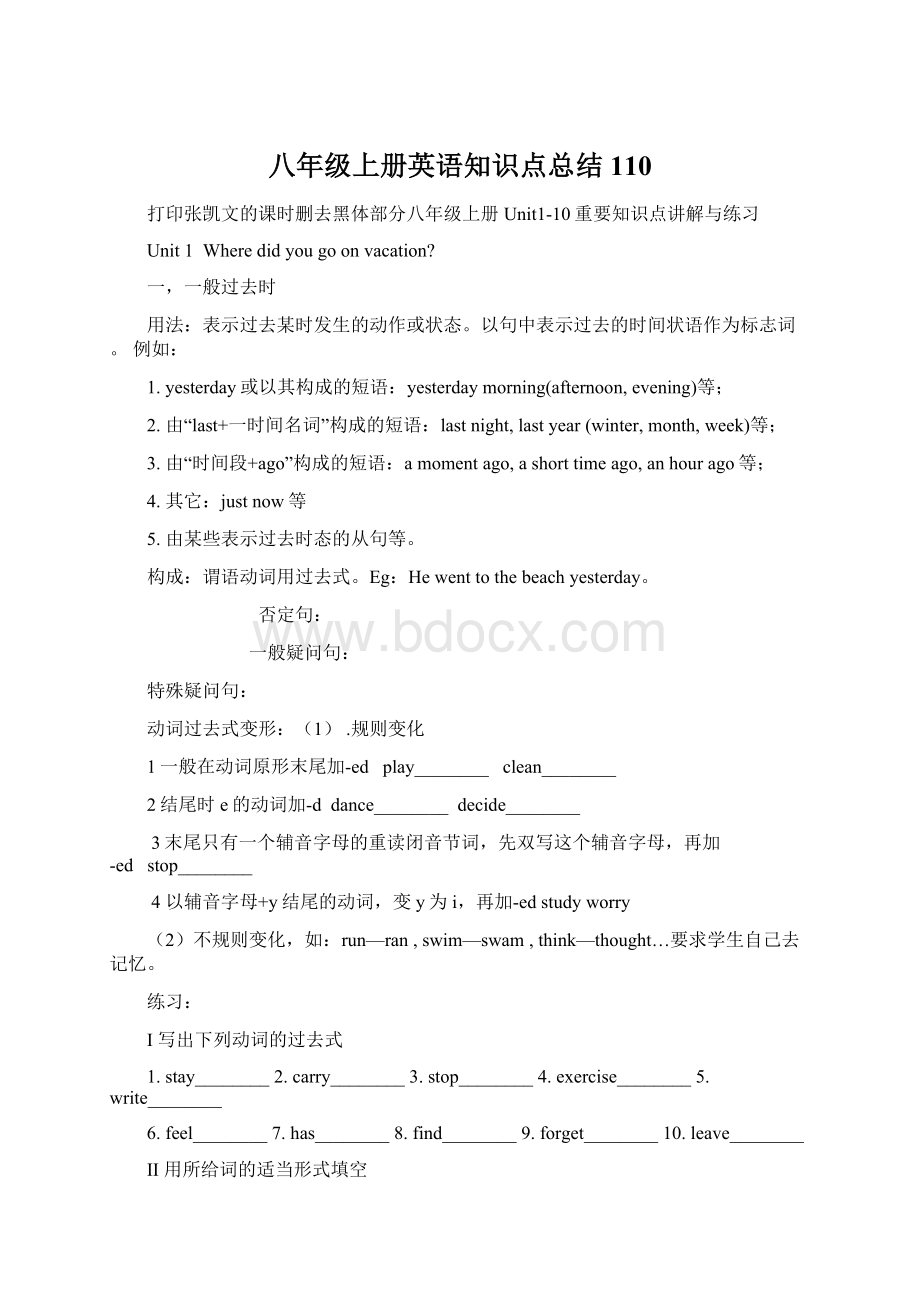八年级上册英语知识点总结110.docx
《八年级上册英语知识点总结110.docx》由会员分享,可在线阅读,更多相关《八年级上册英语知识点总结110.docx(21页珍藏版)》请在冰豆网上搜索。

八年级上册英语知识点总结110
打印张凯文的课时删去黑体部分八年级上册Unit1-10重要知识点讲解与练习
Unit 1 Where did you go on vacation?
一,一般过去时
用法:
表示过去某时发生的动作或状态。
以句中表示过去的时间状语作为标志词。
例如:
1. yesterday或以其构成的短语:
yesterday morning(afternoon, evening)等;
2. 由“last+一时间名词”构成的短语:
last night, last year (winter, month, week)等;
3. 由“时间段+ago”构成的短语:
a moment ago, a short time ago, an hour ago等;
4. 其它:
just now等
5. 由某些表示过去时态的从句等。
构成:
谓语动词用过去式。
Eg:
He went to the beach yesterday。
否定句:
一般疑问句:
特殊疑问句:
动词过去式变形:
(1) .规则变化
1一般在动词原形末尾加-ed play________ clean________
2结尾时e的动词加-d dance________decide________
3末尾只有一个辅音字母的重读闭音节词,先双写这个辅音字母,再加-ed stop________
4 以辅音字母+y结尾的动词,变y为i,再加-edstudyworry
(2)不规则变化,如:
run—ran,swim—swam,think—thought…要求学生自己去记忆。
练习:
I写出下列动词的过去式
1.stay________2.carry________3.stop________4.exercise________5.write________
6.feel________7.has________8.find________9.forget________10.leave________
II用所给词的适当形式填空
1. We_________(play)basketball yesterday afternoon. 2. My uncle_________(live) in Beijing in 2000.
3. They_______(plan)to build a new bridge last year. 4. I _______(study) for a test last night.
5. Lily’s father_______(work)in the office two years ago.
III单项选择
( )1. ---________did you go on vacation?
---Hong Kong.
A. What B. How C. Where D. When
( )2. I_____my homework last night. I went to the cinema with my parents.
A. did B. didn’t C. didn’t do D. don’t do
( )3. ---Did they clean the house yesterday afternoon?
---_________. They cleaned it this morning.
A. No, they don’t B. Yes, they did C. No, they didn’t C. Yes, they do
( )4. ---_____Tom _____a walk yesterday evening?
---No, he____.
A. Did; taked; didn’t B. Does; take; didn’t C. Did; take; didn’t D. Do; take; don’t
( )5. ---The coat looks good on you. Where______you______it?
---In a supermarket.
A. do; buy B. did; buy C. will; buy D. does; buy
二、 复合不定词
Did you go with anyone?
Did you find anything special?
构成:
thing
every
one
where
some
any
every
no
1. 指代对象:
1)-one /-body 只用来指人,在功能和意义上完全相同,可互换。
例:
someone/somebody is crying in the next room
2) –thing的复合不定代词只用来指物。
I can’t hear nothing.
2. 复合不定代词的数 :
复合不定代词做句子主语时,谓语动词用单数。
Nothing is difficult if you put heart into it.
3. 复合不定代词的定语后置。
Can you tell me something interesting?
4.含some/any复合不定代词的用法区别:
(1)含some的通常用于肯定句中。
含any的通常用于否定、疑问或条件句中。
(2)但在表示委婉的疑问和希望得到对方肯定答复的疑问句以及表示反问的问句中,也可使用含
some复合不定代词。
Would you like something to drink?
注意:
--where是副词。
somewhere“在某处”,anywhere“在任何地方”,everywhere“到处,四处”
其中somewhere,anywhere的用法和含some/any复合不定代词的用法一样。
练习:
I单项选择
( )1. ---Where would you like to spend your vacation?
---I’d like to go_____. I hat hot days
A. cool somewhere B. somewhere cool C. hot somewhere D. somewhere hot
( )2. ---Did you see my pen________?
---Sorry, I didn’t
A. somewhere B. anywhere C. nowhere D. Everywhere
( )3. There is_______in today’s newspaper. Let’s read a storybook.
A. something interesting B. nothing interesting C. interesting something D. interesting nothing
( )4. ---Is there________wrong with your computer?
---Yes, it doesn’t work.
A. something B. anything C. nothing D. everything
( )5. ---Have you got______ready for the sports meeting?
---Not yet. We still have__________to do.
A. anything; nothing B.something; everything
C. everything; something C. something; nothing
1I用不定代词或不定副词填空。
1.Ican’thearanything=Icanhear_________.
2.Thereis__________onthefloor.Pleasepickitup.
3.Did_____gotoplaybasketballwithyou?
4.Iphonedyoulastnight,but________answeredit.
5.Idon’tthink___________telephoned.
9.Don’tworry.There’s______wrongwithyourears.
10.There’s__________inthebox.It’sempty.
11.Maybe__________putmypencil_________.Ican’tfindit___________.
三、 反身代词 oneself
my/our
your
him/her/it/them
单数 self
复数 selves
用法:
enjoy oneself= have a good time 玩得高兴
by oneself 独立、独自 dress oneself 自己穿衣服
look after oneself 照看自己helponeselftosth随便吃点……
learnsthbyoneself=teachonselfsth.自学……
练习:
( )1. My sister is twenty years old. She can look after_________.
A. she B. her C. hers D. herself
( )2. Nobody taught me English. I learned it by_________.
A. I B. my C. mine D. myself
( )3. I bought something _____my parents. But________for myself.
A. to; anything B. for; nothing C. for; anything
( )4.(2015湖北随州,27)TheexchangestudentfromAustraliaisafriendof________.Sheenjoyed________attheArtFestivalheldinBeijingyesterday.
A.me;herselfB.mine;hersC.mine;herselfD.me;hers
( )5.(2015福建漳州,32)—LiuMeicanspeakJapanesesowell!
Whotaughther?
—Nobody.Shetaught________.
A.herB.hersC.herself
6.(2015贵州黔东南,22)—Canyoumake________understoodinEnglish?
—Yes,Ican.
A.yourselfB.youC.yoursD.your
7.(2015上海,27)NowadaysIcanchooseonlinecoursesandstudyby________.
A.IB.meC.myD.myself
8.(2015四川成都,43)It’struethatwearenotbornfor________.A.usB.oursC.ourselves
9.(2015吉林,36)Lastmonth,Iwenttothecomputermuseumwithmyparents.Weenjoyed________andlearnedalot.A.usB.ourselvesC.our
其他重点知识点
1.arrivein+大地点/arriveat+小地点/getto+地点/reach+地点到达某地
2.decidetodosth.决定去做某事
3.so+adj.+that+从句如此……以至于……
4.tellsb.(not)todosth.告诉某人(不要)做某事
Unit2howoftendoyouexercise?
一howoften/howlong/howfar/howsoon
howoften
多久一次
对次数和频率提问,如:
always,usually,often.hardlyever,never,sometimes,everyday(week,month,year…),onceaweek,
twiceamonth等表示频度的副词或短语提问
howlong
多长时间
1对“for+一段时间”或”,
②“since+时间段+ago”等时间短语提问
howfar
多远
对距离提问
howsoon
多久
对“in+一段时间“提问
【2013广东4】—________isitfromthevillagetoyourfarm?
—About10minutes’walk.
A.HowoftenB.HowsoonCHowlongD.Howfar
【2014江苏盐城1】-_______doesNancyhelptheoldladywithherhousework?
-Abouttwiceaweek.
A.HowoftenB.HowlongC.HowmuchD.Howsoon
【2014山东泰安】26.—____willyourfathercomebackfromBeijing?
—Intwodays.
A.HowoftenB.HowlongC.HowfarD.Howsoon
二频度副词:
表示频率不确定:
always ; usually ; often sometimes seldom ;hardly ever ; never
表示确定的频率短语:
every day/week/month/year 每天/周/月/年 once a week 每周一次
twice a week 每周两次 twice a month 一月两次 three times a day 一天三次
注:
三次或三次以上一般用“基数词+times”表示。
(3)在句中位置:
频度副词在句中通常放在be动词、助动词、情态动词之后,在实义动词之前。
例:
She is often late for school. He always helps me.
三spend的用法
spend/pay/cost/take花费
动词
主语
宾语
句型结构
spend
人
时间或金钱
sb.spend…onsth/indoingsth
pay
人
金钱
pay….for
cost
物
金钱
sthcostsb.somemoney
take
it
时间
Ittakessb...todosth
【2012湖南永州】Myfather____onehundredthousandyuanonhisnewcar.
A.spentB.costC.paid
【2014贵州黔南州】5.Weshouldremembertospendsometime_yourlovedones,
becausethey'renotgoingtobearoundforever.
A.fromB.withC.inD.on
【2014四川乐山】78.JimwantstobuyanewiPhone.Itwill______(花费)himmorethan
5000yuan.
四“It’s+adj+forsb.+to do sth 做某事是„„的 ”
It’s good for you to eat a lot of vegetables.多吃蔬菜对你有好处。
翻译:
对儿童来说每天得到足够的睡眠很重要。
五although的用法
although=though为连词,意为:
“虽然,尽管”。
注意:
在英语中,当表示“虽然…,但是….”这样的意思时,although和but不能在同一个句子中使用。
也就是说,在一个句子中,有although就没有but,反之亦然。
如:
Althoughthecarisold,itstillrunswell.=Thecarisold,butitstillrunswell.
这辆小车旧了,但是依然跑得不错。
()①_____heisn’trichenough,heoftengivesawaymoneytosomepoorchildren.
A.ThoughB.WhenC.BecauseD.If
()②____heisverytried,hestilltries______.
A.Because;workB.Because;toworkC.Although;workingD.Although;towork
其他重点知识点
1.Howaboutdoing…?
=whataboutdoing......怎么样?
2.wantsb.todosth.想让某人做某事
3..thebestwaytodosth.做某事的最好方式
Unit3I’mmoreoutgoingthenmysister--Unit4What’sthebestmovietheater?
形容词和副词的三级
1.形容词和副词的比较级和最高级的规则变化
(1)一般在词尾直接加-er或-est。
如:
tall—taller—tallest,long—longer—longest
(2)以不发音的字母e结尾的单词在词尾直接加-r或-st。
如:
nice—nicer—nicest,large—lagrer—largest
(3)以辅音字母+y结尾的词,把y变为i,再加er或est。
如:
heavy—heavier—heaviest,busy—busier—busiest,funny—funnier—funniest
(4)在重读闭音节中,末尾只有一个辅音字母,双写这个辅音字母,再加-er或-est。
如:
big—bigger—biggest,hot—hotter—hottest,thin—thinner—thinnest,fat—fatter—fattest
(5)部分双音节词和多音节词分别在原级前加more构成比较级,加most构成最高级。
如:
slowly—moreslowly—mostslowly,
beautiful—morebeautiful—mostbeautiful
important—moreimportant—mostimportant
2.形容词和副词的不规则变化
good/well—better—bestmany/much—more—most
ill/bad/badly—worse—worstlittle—less—leastfar—farther/further—farthest/furthest
3.三级的用法
(1)原级的用法
①只能修饰原级的词有very,quite,so,too等。
如:
Theoldmanis__________walkon.那个老人太累了以至于不能再继续走了。
②原级常用的句型结构
a.“A+v.+as+形容词原级/副词原级+asB”表示“A和B程度相同”。
如:
LucyisasoldasKate.露西和凯特的年龄一样大。
Tomruns__________Mike.汤姆和迈克跑得一样快。
b.“A+v.+not+as/so+形容词原级/副词原级+asB”表示“A不如B……”如:
Thisclassroomis________________thatone.这个教室不如那个大。
Hedoesn'twalkasslowlyasyou.他走路不像你那样慢。
(2)比较级的用法
①可用much,even,alittle等词修饰形容词、副词的比较级。
如:
(1)NowIfeelevenmoretiredthismorningthanIusuallydo.
(2)Ifyoudothat,you’llsoonfeelmuchhealthier.
(3)Katefeltalittlebetter.
②比较级常用的句型结构
1)“A+v.(+倍数)+比较级+than+B”表示“A比B……”或“A比B……几倍”如:
JimistallerthanKate.吉姆比凯特高。
Thisballis_________________________________thatone.这个球比那个大三倍。
2)“A+v.+比较级+than+anyother+单数名词(+介词短语)”表示“A比同